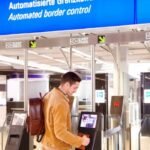Facial recognition might soon be in your local shop — and your local police force — if Scotland’s crime trends keep heading north.
Shoplifting Spike Puts Tech in the Spotlight
Across Scotland, retailers say they’re drowning in theft. Official stats show shoplifting is up 16% this year — a jump that’s left small businesses, big chains, and the cops scrambling for answers.
One line: And for many, the answer looks like a camera.
Nathalie Fullarton, who runs a corner shop in Partick, says the theft got so bad she turned to Facewatch — a live facial recognition system now used by hundreds of UK stores.
She’s blunt: “It had got to the stage where they were just helping themselves and walking out the door,” she told STV News.

How It Works in Shops
Here’s what happens when you walk into her shop. A CCTV camera at the entrance quietly scans your face. If your face matches a flagged database of known troublemakers? The system pings an alert straight to her phone.
One line: Shoplifters hate it — and she loves it.
She says Facewatch has saved her shop more than £8,000 in losses so far. “It’s both reactive and preventative,” she says.
But there’s a catch.
Civil Liberties Groups Raise Alarm Bells
While some store owners swear by it, civil rights groups are furious. They say facial recognition risks creating a ‘Big Brother’ society that watches everyone, all the time.
A campaigner with Liberty UK told me: “This is about more than stopping a chocolate bar thief. We’re talking about everyday people having their faces scanned without consent.”
The Scottish Council for Civil Liberties warned the tech could easily be misused — and lead to racial profiling. They point to evidence from London’s Met Police, where live facial recognition has been linked to false matches, especially among minority communities.
Police Scotland Eyes Expansion
Right now, a form of live facial recognition is already used in Scotland — but mostly in private retail spaces.
That could change.
Police Scotland confirmed they’re considering a wider rollout to spot known criminals in public spaces too, much like London’s Metropolitan Police.
A senior officer, who spoke anonymously because they weren’t authorised to comment publicly, said: “We’ve seen how it works down south. We’re weighing whether it could be part of our toolkit.”
One line: For many, that toolkit feels a bit too powerful.
How Does the Tech Actually Perform?
Let’s break down what live facial recognition does — and where it falls short.
| Aspect | Proponents Say | Critics Say |
|---|---|---|
| Accuracy | High match rate for known faces | False positives still happen |
| Deterrence | Cuts shoplifting, theft | Encourages bias in targeting |
| Privacy Impact | Minimal, say firms | Erodes civil liberties |
| Cost | Cheaper than extra security | Money could go to community policing instead |
One line: It depends who you trust — the software engineers or the civil rights lawyers.
Retailers Feel Police Response Is Lacking
Part of why shops are embracing tech like Facewatch? Many say they’re on their own.
Fullarton says she didn’t feel supported when theft spiked. “Low-value stuff, the police didn’t have the resources to deal with. You can’t blame them — they’re stretched too thin.”
Some retailers argue they’re forced to choose between hiring extra staff or paying for high-tech cameras.
One short paragraph: For many, the cameras win.
Big Brother or Just Smart Policing?
Supporters say it’s not about mass surveillance — it’s about keeping people safe.
One local business group in Glasgow points out the upsides:
-
Less shoplifting means lower costs, less stress, more time to serve real customers.
They argue it’s no different from traditional CCTV — just more efficient.
But critics say it’s different. Very different. “Traditional CCTV records. Facial recognition identifies,” said one privacy expert. “That’s a huge leap.”
What Happens Next?
Police Scotland insists any decision will come with full oversight and consultation. But privacy campaigners want more — they’re calling for strict laws to limit where, when, and how the tech is used.
A quick line: So far, there’s no formal timeline.
In the meantime, stores like Fullarton’s will keep scanning faces. And for now, that means shoplifters might want to think twice about pocketing a chocolate bar.
A UK Trend with Global Implications
Across the UK, use of facial recognition is quietly growing. London’s Met Police ramped up its own program in recent years, deploying vans with cameras in busy areas.
Elsewhere, British supermarkets and major retailers have experimented with facial recognition to curb violence and theft.
One line: The rest of Europe’s watching too.
Will Scotland Buy In?
Back in Glasgow, shoppers have mixed feelings. Some like the idea if it means safer high streets. Others hate the thought of having their faces scanned without clear consent.
A young shopper summed it up: “If you’re not doing anything wrong, maybe you don’t mind. But it still feels weird.”
So is it really worth it? Police Scotland will decide — but civil liberties groups are already warning: once the genie’s out, you can’t stuff it back in the bottle.


















